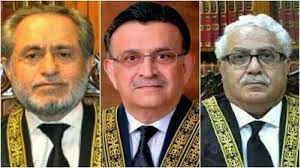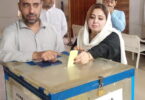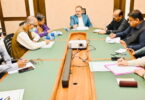F.P. Report
ISLAMABAD: The Supreme Court on Wednesday, while hearing appeals filed by the PTI chairman in the Toshakhana case, said apparently there were shortcomings in the trial court decision but the apex court would wait for the Islamabad High Court decision on the appeal.
The apex court adjourned the hearing on the appeals till tomorrow (Thursday). Chief Justice of Pakistan (CJP) Umar Ata Bandial said the court would wait for IHC’s order before ‘interfering’ in the matter. However, the top judge observed: “Prima facie, there are shortcomings in the trial court verdict.”
A trial court in Islamabad on Aug 5 found the PTI chief guilty of ‘corrupt practices’ in a case pertaining to concealing details of state gifts and sentenced him to three years in prison. The verdict also means that he stood disqualified from contesting general elections for five years.
Subsequently, the PTI chief approached the IHC against the decision. A day earlier, the high court had adjourned the case till Aug 24.
A three-member SC bench – CJP Bandial, Justice Mazahar Ali Akbar Naqvi and Justice Jamal Khan Mandokhail – conducted hearing of the case.
PTI lawyer Latif Khosa and Election Commission of Pakistan’s (ECP) counsel Amjad Pervaiz advanced arguments during the proceedings.
After hearing both sides, the CJP remarked, “Court will not interfere in the Toshakhana case today … we will look at the IHC hearing tomorrow (Thursday) and then resume the proceedings.” The CJP observed that the trial court judge had announced the verdict in the Toshakhana case in haste.
At the outset of the hearing, PTI chief’s lawyer Latif Khosa said his client had filed three petitions against the IHC orders in the apex court.
Advocate Khosa prayed to the court that his client had been accused of misdeclaration of his assets. On the query of Justice Naqvi, Khosa read Section 137 and sub-section 4 of the Election Act, 2017.
Justice Naqvi inquired did the members of the assembly have the authority to send a reference against their fellow members and under which law could assembly members send references against other parliamentarians.
To this, Khosa replied that members of the assembly did not have the authority to send the reference. He said only the NA speaker had this authority.
He further told the court that the electoral body could only take action against an MNA within a fixed time of 120 days after the submission of financial statements.
“The present case is not whether a reference could have been sent against the PTI chairman or not,” Justice Mandokhel said. “You have challenged the decision of the Islamabad High Court.”
CJP Bandial also told Khosa that the issue of the case’s jurisdiction had been challenged.
“You yourself are saying that the case is pending in another court,” the CJP said. “Our stance is that the Toshakhana complaint should have first been sent to the magistrate,” Khosa pointed out.
“According to you, the magistrate conducts the initial inquiry and then the sessions court holds the trial,” the chief justice asked.
Justice Mandokhel explained that the law states a magistrate would review the complaint and then send it to the sessions court.
After hearing arguments from Khosa and Amjad Pervaiz, the CJP remarked, “We will not interfere in the Toshakhana case today. We will look at the IHC hearing tomorrow and resume the hearing.”
Courtesy: (Dunyanews)







